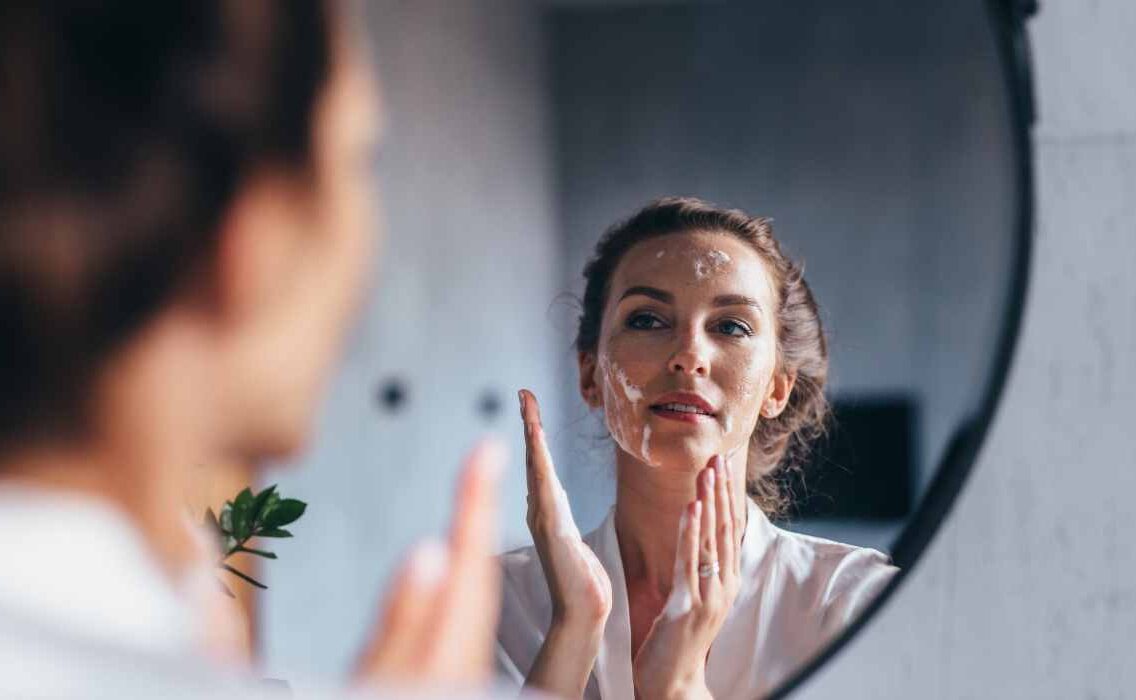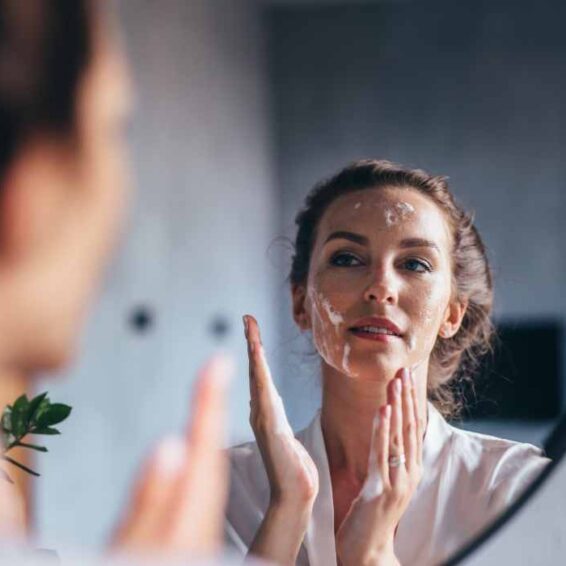Taking care of your skin is an essential part of your health and well-being. It doesn’t have to be complicated or expensive, and you can do it all from the comfort of your home. Here are some tips to help you achieve clear and healthy skin.
1. Wash your face regularly
Washing your face twice a day can help remove dirt, oil, and dead skin cells that can clog your pores and lead to breakouts. Use a gentle cleanser that is designed for your skin type. If you have oily skin, look for a cleanser that can help control oil production. If you have dry skin, look for a hydrating cleanser that won’t strip your skin of its natural oils.
Washing your face twice a day is a great way to keep your skin clean and healthy. Choosing the right cleanser for your skin type is also important to avoid stripping your skin of its natural oils or causing irritation. In addition to choosing the right cleanser, it’s also important to use lukewarm water and avoid scrubbing too hard, as these can also cause irritation and damage to the skin. After washing your face, be sure to pat your skin dry with a clean towel and follow up with a moisturizer to keep your skin hydrated and supple.
2. Moisturize
Moisturizing your skin helps to keep it hydrated and prevent dryness. Choose a moisturizer that is non-comedogenic, meaning it won’t clog your pores. If you have oily skin, look for a lightweight, oil-free moisturizer. If you have dry skin, look for a richer, more emollient moisturizer.
Moisturizing your skin is important to keep it hydrated and healthy, and choosing the right moisturizer for your skin type is crucial to avoid clogged pores or excess oil production. Non-comedogenic moisturizers are formulated to be lightweight and won’t clog your pores, which is important for preventing breakouts. If you have oily skin, a lightweight, oil-free moisturizer will help to hydrate your skin without adding excess oil.

For dry skin, a richer, more emollient moisturizer will help to replenish lost moisture and provide long-lasting hydration. Additionally, you may want to consider a moisturizer with additional benefits, such as one that contains SPF to protect your skin from the sun’s harmful UV rays. Overall, choosing the right moisturizer can make a big difference in the health and appearance of your skin.
A rich and emollient moisturizer is perfect for dry skin as it helps to restore lost moisture and provide long-lasting hydration. As you mentioned, it’s also important to look for a moisturizer with SPF to protect your skin from the harmful UV rays of the sun. Sun exposure can cause premature aging, sunburn, and skin cancer, so it’s crucial to protect your skin by wearing sunscreen or using a moisturizer with SPF.
Overall, choosing the right moisturizer that meets your specific skincare needs can make a big difference in maintaining the health and appearance of your skin
3. Exfoliate
Exfoliating your skin once or twice a week can help remove dead skin cells and unclog pores. Use a gentle exfoliating scrub or a chemical exfoliant that contains glycolic or salicylic acid. If you have sensitive skin, use an exfoliant that is formulated for sensitive skin.
There are two main types of exfoliants: physical and chemical. Physical exfoliants are typically scrubs that contain small particles that physically remove dead skin cells. Chemical exfoliants, on the other hand, contain acids that dissolve the bonds between dead skin cells and allow them to be easily sloughed off.
Gentle exfoliation can help to brighten and smooth the skin’s texture, but it’s important to choose an exfoliant that is appropriate for your skin type. If you have sensitive skin, look for a gentle exfoliant that won’t irritate or cause redness. Exfoliating too frequently or using an exfoliant that is too harsh can actually damage the skin and lead to inflammation and dryness.
In general, it’s best to exfoliate once or twice a week. Be sure to follow up with a moisturizer to help hydrate and protect the skin. With consistent exfoliation and a healthy skincare routine, you can help maintain smooth, glowing skin.
4. Protect your skin from the sun
Exposure to UV rays can cause sun damage, premature aging, and skin cancer. Protect your skin by wearing broad-spectrum sunscreen with an SPF of at least 30 and avoiding direct sunlight during peak hours. You can also wear protective clothing, such as a hat or long-sleeved shirt, to further shield your skin from the sun.
Protecting your skin from the harmful effects of the sun is crucial for maintaining healthy and youthful-looking skin. Sun damage can cause premature aging, sunburn, and skin cancer, so it’s important to take steps to protect your skin. Wearing broad-spectrum sunscreen with an SPF of at least 30 can help block both UVA and UVB rays that can cause damage to the skin. It’s important to apply sunscreen generously and reapply it every two hours or more often if you are swimming or sweating.
You can also protect your skin by avoiding direct sunlight during peak hours, typically from 10 a.m. to 4 p.m. Additionally, wearing protective clothing such as a hat, long-sleeved shirt, and sunglasses can also help shield your skin from the sun’s harmful rays. Overall, taking steps to protect your skin from the sun is an essential part of any skincare routine.
5. Eat a healthy diet
Eating a diet rich in fruits, vegetables, whole grains, and lean proteins can help nourish your skin from the inside out. Avoid processed foods and sugary drinks, which can lead to inflammation and breakouts. Also, make sure to drink plenty of water to keep your skin hydrated.
A healthy diet can play a significant role in maintaining healthy skin. Eating a diet rich in fruits, vegetables, whole grains, and lean proteins can provide your skin with the essential vitamins, minerals, and nutrients it needs to stay healthy and radiant.
Fruits and vegetables are particularly beneficial for the skin, as they are rich in antioxidants that can help protect against damage from environmental factors such as pollution and UV rays. Additionally, whole grains and lean proteins can provide important building blocks for the skin, helping to maintain its structure and elasticity.
On the other hand, processed foods and sugary drinks can lead to inflammation, which can trigger breakouts and other skin issues. Drinking plenty of water is also important for maintaining skin hydration, as dehydration can lead to dryness and flakiness.
Overall, a healthy diet can help support the health and appearance of your skin. In addition to eating a balanced diet, it’s important to follow a consistent skincare routine that includes cleansing, moisturizing, and protecting your skin from the sun’s harmful rays.
6. Get enough sleep
Getting enough sleep is essential for your overall health and well-being, and it can also help improve the appearance of your skin. When you sleep, your body repairs and regenerates skin cells, which can help reduce the appearance of fine lines and wrinkles.
During sleep, the body’s cells repair and regenerate, including the skin cells. This means that getting enough quality sleep can help improve the appearance of the skin by reducing the appearance of fine lines and wrinkles, as well as improving skin tone and texture.
Additionally, lack of sleep can lead to increased stress levels, which can contribute to skin issues such as acne and eczema. When you are sleep-deprived, your body produces more of the stress hormone cortisol, which can lead to inflammation and other skin problems.
To promote healthy skin, aim to get at least seven to eight hours of sleep each night. Establishing a consistent sleep routine, including going to bed and waking up at the same time each day, can also help improve the quality of your sleep.
By following these simple tips, you can achieve clean and clear skin without leaving your home. Remember to be consistent with your skincare routine and give your skin time to adjust to any new products or treatments. With a little patience and dedication, you can have healthy, glowing skin that you’re proud to show off.




